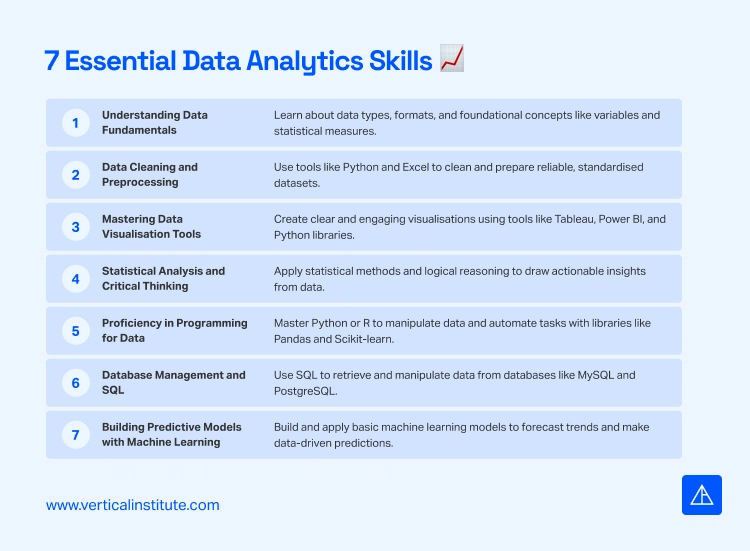Data analytics drives modern decision-making. It powers industries like healthcare, finance, and e-commerce. Companies rely on data to improve efficiency, uncover trends, and stay competitive. As demand grows, professionals skilled in analytics hold a major advantage.
Mastering essential data analytics skills will set you apart, whether you’re a beginner or already in the field and looking to solidify your expertise.
Here’s a guide to developing seven critical skills for a strong start in 2025:
1. Understanding Data Fundamentals
- Learn the difference between structured, unstructured, and semi-structured data.
- Understand key concepts like datasets, variables, and statistical measures (mean, median, etc.).
- Get familiar with data formats such as tables, arrays, and JSON.
- Build a strong foundation for exploring advanced analytical techniques.
2. Data Cleaning and Preprocessing
- Handle missing values and detect outliers to ensure data accuracy.
- Use normalisation and scaling techniques to standardise data.
- Learn tools like Python (Pandas) and Excel to clean data efficiently.
- Practice solving real-world data challenges to improve reliability.
Related: Best Excel Functions For Data Analysis in 2024
3. Mastering Data Visualisation Tools
- Use tools like Tableau, Power BI, or Python libraries (Matplotlib, Seaborn).
- Create graphs, charts, and dashboards to simplify complex data.
- Understand when to use specific visualisations (e.g., bar charts for comparison, and scatter plots for trends).
- Focus on clarity and storytelling to engage your audience.
4. Statistical Analysis and Critical Thinking
- Learn essential statistical methods like regression, correlation, and hypothesis testing.
- Combine technical skills with logical reasoning to identify trends and anomalies.
- Develop a questioning mindset to challenge assumptions and validate results.
- Use statistics to draw conclusions that support data-driven decisions.
5. Proficiency in Programming for Data
- Master programming languages like Python or R for data manipulation and analysis.
- Use libraries such as NumPy, Pandas, and Scikit-learn to simplify tasks.
- Focus on writing clean, reusable code for better project management.
- Build hands-on projects to solidify your programming skills.
6. Database Management and SQL
- Learn SQL to retrieve, filter, and manipulate data in relational databases.
- Practice joining tables, aggregating data, and writing efficient queries.
- Understand how to work with databases like MySQL, PostgreSQL, or Microsoft SQL Server.
- Develop the ability to extract meaningful insights directly from data repositories.
7. Building Predictive Models with Machine Learning
- Explore basic machine learning algorithms like linear regression and clustering.
- Use tools such as Scikit-learn, TensorFlow, or Google AutoML to build models.
- Start with simple predictive models before advancing to complex techniques.
- Understand how machine learning integrates with analytics to forecast trends and outcomes.

How to Get Started in Data Analytics in 2025
Breaking into data analytics doesn’t have to be overwhelming. Follow these steps to build your skills and confidence:
Choose the Suitable Tools for Your Proficiency
Selecting the right tools is an essential first step in your data analytics journey. Excel provides a solid foundation for beginners with its user-friendly interface and basic analysis functions. Once you’re comfortable, transition to advanced tools like Python, Tableau, or SQL, which offer greater versatility and efficiency for handling larger datasets and more complex analyses. Practising on small datasets will help you gradually develop confidence and proficiency.
Related: Why Learn Tableau? 4 Key Reasons to Elevate Your Data Analytics Skills
Take a Course or Workshop
Enrolling in a structured course or workshop is one of the fastest and most effective ways to build your data analytics skills. Programs that include hands-on projects, mentorship, and industry insights ensure you develop technical expertise and learn how to apply those skills to real-world scenarios. This combination of practical and theoretical knowledge prepares you to handle the challenges of modern data-driven roles.
Vertical Institute’s Data Analytics course offers a comprehensive curriculum for beginners and professionals. You’ll learn critical tools like Excel, SQL, and Tableau, master data cleaning and visualisation techniques, and gain experience solving real-world problems. With guidance from experienced industry practitioners, you’ll build a strong foundation to kickstart or elevate your career in data analytics.
Practise on Real Data
Practical experience is the key to mastering data analytics. Platforms like Kaggle and Google Dataset Search offer free datasets that you can use to hone your skills. Practice solving real-world problems by cleaning, analysing, and visualising these datasets. This hands-on approach will deepen your understanding of concepts and prepare you for actual challenges in the workplace.
Build a Portfolio
A well-curated portfolio is crucial for showcasing your skills to potential employers. Include projects demonstrating your ability to clean messy data, perform insightful analysis, and create meaningful visualisations. Highlight how your work contributed to solving problems or generating insights. A strong portfolio validates your capabilities and sets you apart from other candidates.
Conclusion
As industries increasingly harness data for innovation and growth, the demand for skilled professionals continues to rise. You can become a valuable contributor in any field by equipping yourself with the right tools, practical experience, and a forward-thinking mindset. Commit to learning by attending courses or workshops, staying curious, and taking consistent steps toward mastering analytics. The future is data-driven, and now is the time to seize the opportunity.
Ready to Explore Your Earning Potential?
Are you curious about data analyst salaries or striving to boost your earning potential? Whether you’re exploring a career in data analytics or seeking advancement in your current role, this tool provides valuable insights to guide your next steps.
SALARY CALCULATOR
Discover how much you can earn in your dream role.
About Vertical Institute
Vertical Institute is shaping the future of work by preparing individuals for tomorrow’s job market. Our courses and certification focus on teaching essential skills and nurturing the next generation of innovators and leaders.
As an Approved Training provider (ATO) accredited by SkillsFuture Singapore (SSG) and the Institute of Banking & Finance Singapore (IBF), our courses adhere to the highest standards. They are government-subsidised and eligible for SkillsFuture Credits or NTUC UTAP Funding.



